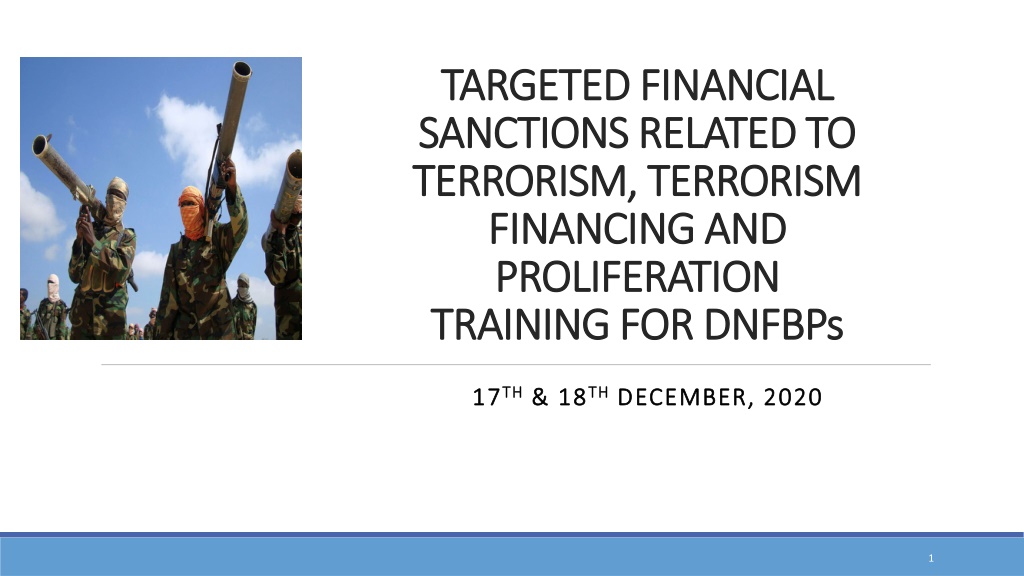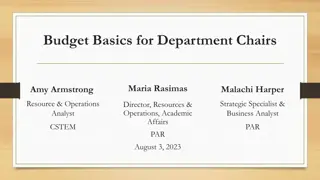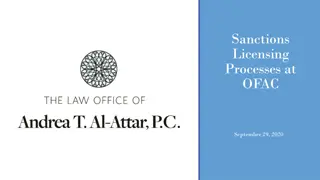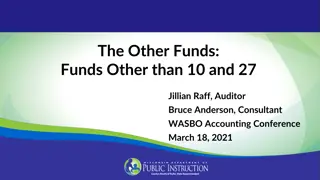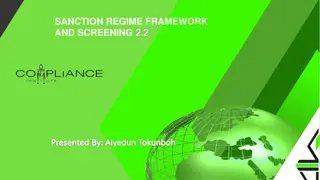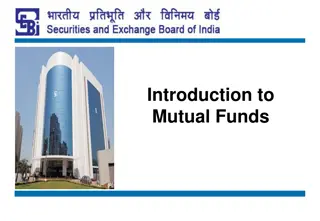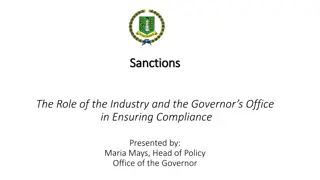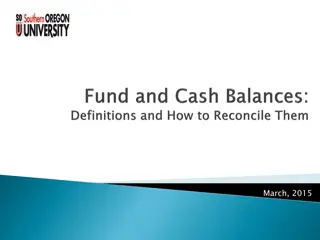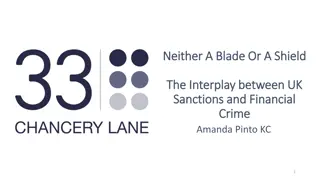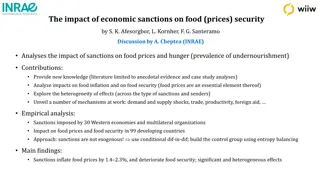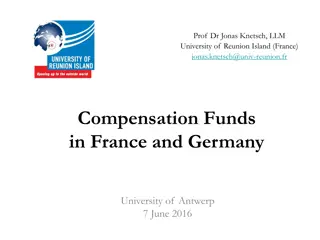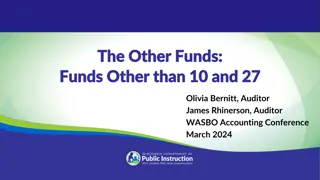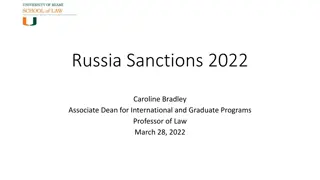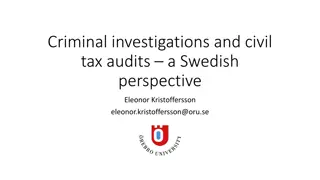Understanding Targeted Financial Sanctions and Funds Definition
Explore the concept of Targeted Financial Sanctions (TFS), including asset freezing and prohibitions to hinder the flow of funds to designated entities. Learn the definition of funds according to the Anti-Terrorism Act, 2018. Verify if your organization has a sanctions program, undergoes AML/CFT training, and maintains an updated list of designated entities. Comprehend the strategic focus of TFS and the common sanctions measures imposed.
Uploaded on Aug 06, 2024 | 0 Views
Download Presentation

Please find below an Image/Link to download the presentation.
The content on the website is provided AS IS for your information and personal use only. It may not be sold, licensed, or shared on other websites without obtaining consent from the author. Download presentation by click this link. If you encounter any issues during the download, it is possible that the publisher has removed the file from their server.
E N D
Presentation Transcript
TARGETED FINANCIAL TARGETED FINANCIAL SANCTIONS RELATED TO SANCTIONS RELATED TO TERRORISM, TERRORISM TERRORISM, TERRORISM FINANCING AND FINANCING AND PROLIFERATION PROLIFERATION TRAINING FOR DNFBPs TRAINING FOR DNFBPs 17 17TH TH& 18 & 18TH THDECEMBER, 2020 DECEMBER, 2020 1
QUESTIONS TO CONSIDER QUESTIONS TO CONSIDER - Does your organization have a sanctions program? What does it look like? Do you apply a risk based approach to sanctions? Is it on-going? - Have you (and relevant staff) undergone anti money laundering and countering the financing of terrorism/proliferation training this year? - - Do you have an updated list of designated entities and listed entities in electronic form? Do you regularly review the United Nations Security Council webpage to review it s content and Sanctions Regime/information? (Website: https://www.un.org/securitycouncil/sanctions/information). Do you scrutinize your records to determine whether a designated entity holds, owns or Controls funds or has any form of relationship with any of your clients? - 2
TARGETED FINANCIAL SANCTIONS TARGETED FINANCIAL SANCTIONS What are Targeted Financial Sanctions (TFS)? The term targeted financial sanctions means both asset freezing and prohibitions to prevent funds or other assets from being made available, directly or indirectly, for the benefit of designated persons and entities (Source: FATF Glossary). The United Nations Security Council Sanctions Regimes defines Targeted as: meaning that they are intended to have limited, strategic focus on certain individuals, entities, groups or undertakings. The most common sanctions measures are travel bans, asset freezes and arms embargos. 3
DEFINITION OF FUNDS DEFINITION OF FUNDS Section 2 of the Anti-Terrorism Act, 2018 defines funds as: any assets, economic resources, property of every kind, whether corporeal or incorporeal, tangible or intangible, movable or immovable, however acquired, wherever located, legal documents or instruments in any form, electronic or digital, evidencing title to, or interest in, such assets, economic resources or property, including but not limited to currency, bank credits, deposits and other financial resources, travelers cheques, bank cheques, money orders, promissory notes, shares, non-shareholding interest, securities, bonds, drafts, letters of credit, and any interest in, dividends or others income on or value accruing from or generated by, in full or in part, any such assets, economic resources or property. 4
WHY IMPOSE FINANCIAL SANCTIONS? WHY IMPOSE FINANCIAL SANCTIONS? Financial Sanctions are imposed to: (i) coercea regime, or individuals within a regime, into changing their behavior (or aspects of it) by increasing the cost on them to such an extent that they decide to cease the offending behavior, (ii) constraina target by denying them access to key resources needed to continue their offending behavior, including the financing of terrorism or nuclear proliferation; (iii) signal disapproval, stigmatizing and potentially isolating a regime or individual, or as a way of sending broader political messages nationally or internationally; and/or (iv) protect the value of assets that have been misappropriated from a country until these assets can be repatriated. Monetary Penalties for Breaches of Financial Sanctions. (Source: Office of Financial Sanctions Implementation HM Treasury. https://assets.publishing.service.gov.uk/government/uploads/system/uploads/attachment_data/file/708990/Monetary_Pe nalties_Guidance_web.pdf). 5
IMPORTANCE OF TARGETED FINANCIAL IMPORTANCE OF TARGETED FINANCIAL SANCTIONS (TFS) REPORTING IN THE BAHAMAS SANCTIONS (TFS) REPORTING IN THE BAHAMAS DNFBP S with Bahamian only clients must comply with TFS reporting for the following reasons: domestic co-operation is important in the global flight. The FATF Methodology required the Bahamas to implement such sanctions without delay in order to comply with relevant United Nations Security Council Resolutions therefore all DNFBP s must comply and respond to the Commission; Legislation requires it. Section 3A of the International Obligations (Economic and Ancillary Measures) (Amendment) Act, 2019 requires DNFBPs to comply with United Nations Security Council Resolutions; primary threats, of domestic origin, within The Bahamas include fraud (fraud by false pretenses, stealing by reason of employment, possession of forged documents, counterfeit currency, and forgeries); human trafficking; human smuggling; firearms and drug trafficking; and transactions can occur domestically and internationally regarding the monetary settlement of commercial, real estate, trust and corporate services or the use of legal persons/ arrangements, therefore DNFBPs with domestic only clients can be exposed to ML/TF risk. 6
THE FATFS COMMITMENT TO TFS THE FATF S COMMITMENT TO TFS FATF Recommendation 6 (Targeted Financial Sanctions related to Terrorism and Terrorist Financing) and 7 (Targeted Financial Sanctions related to Proliferation) required The Bahamas to implement the targeted financial sanctions regimes to comply with the United Nations Security Council Resolutions (UNSCRs) relating to the prevention and suppression of terrorism and terrorist financing and proliferation/WMD and its financing. Features of FATF Recommendation 6 TFS related to Terrorism and Terrorist Financing (Source: FATF Methodology 2013) Guideline (G) 6.1/6.2 - Countries are to identify and designate a competent authority for proposing persons/entities o Have mechanisms for identifying targets for designation o Standard of proof: reasonable grounds or reasonable basis G. 6.4 - Implement TFS without delay G. 6.5 Identify DOMESTIC competent authorities to implement and enforce TFS 7
THE FATFS COMMITMENT TO TFS THE FATF S COMMITMENT TO TFS Features of FATF Recommendation 7- TFS related to Proliferation G. 7.1 Implement TFS without delay G. 7.2 Identify Competent Authorities to implement and enforce TFS G. 7.3 Monitor DNFBPs, ensure compliance with relevant laws oPenalty: civil, administrative or criminal sanctions. 8
BAHAMIAN LEGISLATION ON FINANCIAL BAHAMIAN LEGISLATION ON FINANCIAL SANCTIONS SANCTIONS The International Obligations (Economic and Ancillary Measures) Act (IOEAMA) (and Amendment) Act provides that when the United Nations Security Council (UNSC) adopts a resolution to impose a sanction in respect of a person or foreign state, that resolution, any annex, schedule or any amendments thereto shall have full effect and force of law in The Bahamas from the date of adoption by the UNSC. The Anti-Terrorism Act, 2018 and the Anti-Terrorism Regulations, 2019 (and Amendment Orders) and the IOEAMA Act and Amendment Orders provide the legal basis for the automatic domestic implementation of the United Nations Security Council Resolutions into Bahamian Law. 9
BAHAMIAN LEGISLATION ON FINANCIAL BAHAMIAN LEGISLATION ON FINANCIAL SANCTIONS SANCTIONS Sections 44 and 45 of the ATA 2018 requires DNFBPs when they receive the list of designated entities to apply the following procedures The DNFBPs shall without delay Freeze all the funds held by it in the name of a designated entity; Inform the Attorney-General and the Financial Intelligence Unit that a designated entity has funds with the DNFBPs providing all details of such funds; and Inform the designated entity that the funds held at the DNFBPs have been frozen. 10
BAHAMIAN LEGISLATION ON FINANCIAL BAHAMIAN LEGISLATION ON FINANCIAL SANCTIONS SANCTIONS Within a period of fourteen days after the date on which the designated entity has been informed that the funds held in the account(s) of the designated entity at the DNFBPs have been frozen, the designated entity may institute proceedings in the Supreme Court for an order releasing the funds that have been frozen in its accounts; The Attorney General may commence proceedings under section 45 leading to the making of an order by the court for the confiscation of the assets held in the account (s) of the designated entity at any time after the passage of fourteen days after the designated entity has been informed that the funds held in the account(s) of the designated entity at the DNFBPs have been frozen. 11
THE OBLIGATION TO FREEZE WITHOUT DELAY DELAY DEFINED: WITHOUT The Glossary of the FATF Recommendations defines withoutdelay , with respect to the Al-Qaida/Taliban sanctions regimes, as ideally, within a matter of hours of a designation by the United Nations Security Council or its relevant Sanctions Committee (e.g. the 1267 Committee, or the 1988 Committee). For the purposes of resolution 1373(2001), the term without delay means upon having reasonable grounds, or a reasonable basis, to suspector believe that a person or entity is a terrorist, one who finances terrorism or a terrorist organization. In both cases, the term without delay should be interpreted in the context of the need to prevent the flight or dissipation of funds or other assets which are linked to terrorists, terrorist organizations, and those who finance terrorism. 12
HOW ARE REGISTRANTS INFORMED OF HOW ARE REGISTRANTS INFORMED OF FINANCIAL SANCTIONS? FINANCIAL SANCTIONS? The National Identified Risk Framework Coordinator is responsible for maintaining a list of designated persons and entities as provided by the United Nations. The NIRFC ensures that the list remains current and circulates the list to Regulators without delay upon receipt from the Ministry of Foreign Affairs. Regulators distribute the list to DNFBPs and financial institutions requesting information on whether any designated person or entity on the list has funds in The Bahamas (Section 43 (2) of the ATA 2018). 13
WHAT SHOULD DNFBPS LOOK OUT FOR? WHAT SHOULD DNFBPS LOOK OUT FOR? Information included in the list includes: Full Name, Aliases, Date of birth, Passport details, National Identification numbers, Addresses, Employment information, Government role, Date the designated person was added to the list. Social security number and Tax ID. 14
WHAT RIGHTS DO ENTITIES HAVE? WHAT RIGHTS DO ENTITIES HAVE? (i) Be notified of the designation and its implications and information concerning the reasons for the designations (s. 44(iii) ATA 2018 and r. 5 ATR 2019), (ii) Request the Court to review the Order made and information on the de- listing process, including a contact person to answer questions (s. 45 (6) ATA 2018), (iii) Make representations to the Court in respect of any proceedings for the review of an order (s 45(17) ATA 2018), and (v) Be notified of the procedure for access to funds/ assets (r. 5 ATR 2019). 15
GUIDELINES FOR DNFBPs TO COMPLY WITH UN GUIDELINES FOR DNFBPs TO COMPLY WITH UN SANCTIONS OBLIGATIONS SANCTIONS OBLIGATIONS DNFBPs can comply with UN sanctions obligations by: Immediately freeze any identified assets or funds held or controlled by designated persons and entities without delay; Not dealing with assets and not making them available for the benefit of a designated person/entity; Report the designated person/entity to the FIU, the AG and notify the CC; Maintain a master client list or access the UN consolidated list and update/check the list against client transactions lists, paying particular attention to the element of risk as it pertains to the activities of clients. This risk is to be applied according to the Risk Based Approach designed and implemented by the DNFBP; 16
GUIDELINES FOR DNFBPs TO COMPLY WITH UN GUIDELINES FOR DNFBPs TO COMPLY WITH UN SANCTIONS OBLIGATIONS SANCTIONS OBLIGATIONS Periodically check the FATF s High risk and other monitored jurisdictions at: http://www.fatf-gafi.org/publications/high-risk-and-other-monitored- jurisdictions/documents/increased-monitoring-october-2020.html; accelerate the exchange of information, especially with timely responses of all actions regarding combating ML, TF, and PF; ensure all documents in your possession are not forged or falsified; 17
GUIDELINES FOR DNFBPs TO COMPLY WITH UN GUIDELINES FOR DNFBPs TO COMPLY WITH UN SANCTIONS OBLIGATIONS SANCTIONS OBLIGATIONS Have effective procedures and mechanisms to identify designations of persons and entities. Implement a risk management system for customers and beneficial owners and screen clients to determine and monitor if they are listed on the UN sanctions list as individuals or designated entities and subject to sanctions from any other official body or government that would prohibit the establishment of a facility or conduct of a transaction and implement the prohibition requirements of the relevant UNSCR s including attempted transactions. The DNFPBs should have a procedure for vetting its customers to include methods for checking the variations in spellings, reversals, shortened names, maiden names, alias, etc. The DNFPBs should maintain records for at least 5 years (Section 15, FTRA 2018); 18
GUIDELINES FOR DNFBPs TO COMPLY WITH UN GUIDELINES FOR DNFBPs TO COMPLY WITH UN SANCTIONS OBLIGATIONS SANCTIONS OBLIGATIONS Provide their full cooperation with all Regulators. The DNFBPs should ensure that all updated notifications released from CC or the FIU are immediately communicated to all internal staff. The DNFBPs compliance officer should keep up to date on any changes in reference to new listings of designated persons/entities, de-listing of designated information is provided to currently listed persons/entities, when there are other significant changes to financial sanctions; persons/entities, additional Ensure they are in possession of all Gazettes, read the newspapers daily and check emails and the CC s Notices at https://ccb.finance.gov.bs/news/general- news/; 19
GUIDELINES FOR DNFBPs TO COMPLY WITH UN GUIDELINES FOR DNFBPs TO COMPLY WITH UN SANCTIONS OBLIGATIONS SANCTIONS OBLIGATIONS Ensure there are adequate internal controls (including due diligence procedures and training programs as appropriate) to identify the existing accounts, transactions, funds or other assets of designated persons and entities; Keep updated with Domestic (or other) additions to the Consolidated List by the AG (Section 47 ATA 2018). Such List/Order(s) will be published in the Gazette and in the newspapers for circulation in The Bahamas (Section 45(13) ATA 2018); and 20
GUIDELINES FOR DNFBPs TO COMPLY WITH UN GUIDELINES FOR DNFBPs TO COMPLY WITH UN SANCTIONS OBLIGATIONS SANCTIONS OBLIGATIONS Implement a Risk Based Approach to determine the frequency of monitoring client accounts against the sanctions list. As a general principle, screening should be done when establishing a new relationship, to ensure the relationship is permissible, and then at regular intervals, either upon a trigger event or as customer and/or list information changes, to validate that the relationships remain permissible. Where either internal or external data sets change frequently, periodic screening may be as often as daily, but longer intervals between periodic rescreening may be acceptable in situations where change is less frequent or the risk of a potential sanctions exposure is low FATF International Best Practices. 21
DELISTING FROM THE UN LIST DELISTING FROM THE UN LIST Those who are subject to financial sanctions can request their delisting. In 2006, the Security Council established the Focal Point for De-listing within the Department of Political Affairs, as part of the Council s commitment to ensure that fair and clear procedures existed for placing individuals and entities on sanctions lists and for removing them, as well as for granting humanitarian exemptions. The Focal Point receives and processes de-listing requests from individuals and entities on all sanctions lists except for the ISIL (Da esh) & Al-Qaida Sanctions List, which is dealt with by the Office of the Ombudsperson established in 2009. In accordance with the Focal Point procedures, as outlined in the annex to resolution 1730 (2006), the decision to de-list rests solely with the relevant sanctions committee. For more information on the Procedures for Delisting - UNSCR 1267 and successive resolutions see the Office of the Attorney General s Guidance note on delisting procedures located on the CC s website: https://ccb.finance.gov.bs/wp-content/uploads/2020/11/2020-30-10-Procedures- for-Delisting-Proceedures-UNSCRs-1.pdf Subsidiary Organs of the UNSC (n 5), page 36. 22
FALSE POSITIVES FALSE POSITIVES If the Attorney General is satisfied that the individual or entity is not the actual listed entity, the designated terrorist entities or individuals can request that their funds and other financial assets/resources be unfrozen. The Attorney- General may make an application to the Court for the funds to be unfrozen on the basis of a false positive or mistaken identity (ATR 2019, r. 23). If you believe your assets have been frozen mistakenly as a result of mistaken identity, contact the institution that froze your assets requesting an explanation and include a request that they identify whom they believe you are a target match for on the consolidated list. 23
OFFENCES AND PENALTIES OFFENCES AND PENALTIES The following offences and penalties apply to DNFBPs: oSection 49(1) of the ATA 2018 sets out the duty of DNFBPs to report the existence of funds from a designated entity, listed entity or from an entity/legal entity that commits, participates, or facilitates terrorist acts or financing of terrorism. Section 49(3) ATA 2018 sets out the fine penalty which is not to exceed Two Hundred and Fifty Thousand dollars ($250,000). oSection 69(1) ATA 2018 sets out the duty of DNFBPs to disclose information relating to offences and terrorist acts. Section 69(4) ATA 2018 sets out the penalty of a fine of Ten Thousand Dollars ($10,000) and imprisonment for two (2) years. oSection 70 ATA 2018 sets out the duty for DNFBPs to disclose information relating to property used for the commission of offences. The penalty for this offence is imprisonment for up to five (5) years (section 70(4) ATA 2018). 24
Thank Thank- -You! You! Kindly visit the CC s website at https://ccb.finance.gov.bs/ for: the CC s Sanctions Guidance Note issued on 30th November 2020, and other guidance notes on anti-money laundering, countering the financing of terrorism and proliferation financing. 25
